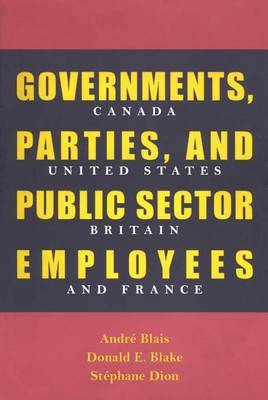Pitt Series in Policy and Institutional Studies
1 total work
Governments, Parties, and Public Sector Employees
by Department of Political Science Andre Blais and Donald E. Blake
Published 30 April 1997
They are questions of long standing in political science: Do parties matter? What effects, if any, do politics have on society? The authors of this careful and articulate book approach these questions by looking at one social group -- public sector employees -- and examine the hypothesis that parties and governments of the left are more generous toward these employees than those of the right. This far-reaching study encompasses the central governments of four countries -- Canada, United States, Britain, and France -- from the 1950s to the end of the 1980s.Public sector employees, being both part of society and part of government, offer an excellent case study to test the autonomy of politics from society. After rigorous research, Blais, Blake, and Dion confirm that in the great majority of cases, the left is indeed more generous than the right, with some unusual and provocative exceptions. There is an alliance, they affirm, albeit a loose one, between pubic sector employees and the left, an alliance that is consistent over time in Europe and in North America.Governments, Parties, and Public Sector Employees also shows that when the left has to choose between more employment and higher wages for public employees, it tends to choose the former, suggesting that ideology is more important than supporters' pressures in inducing party divergence."This is solid piece of comparative analysis. Rather than just supporting conventional wisdom, (the authors) find enough odd cases, nuances, and surprises to fully justify their analysis as something new and very interesting. Its combination and accessibility and solid social science should make this book useful to both advancedundergraduates, the informed public, and the social science community". David Loweny University of North Carolina
